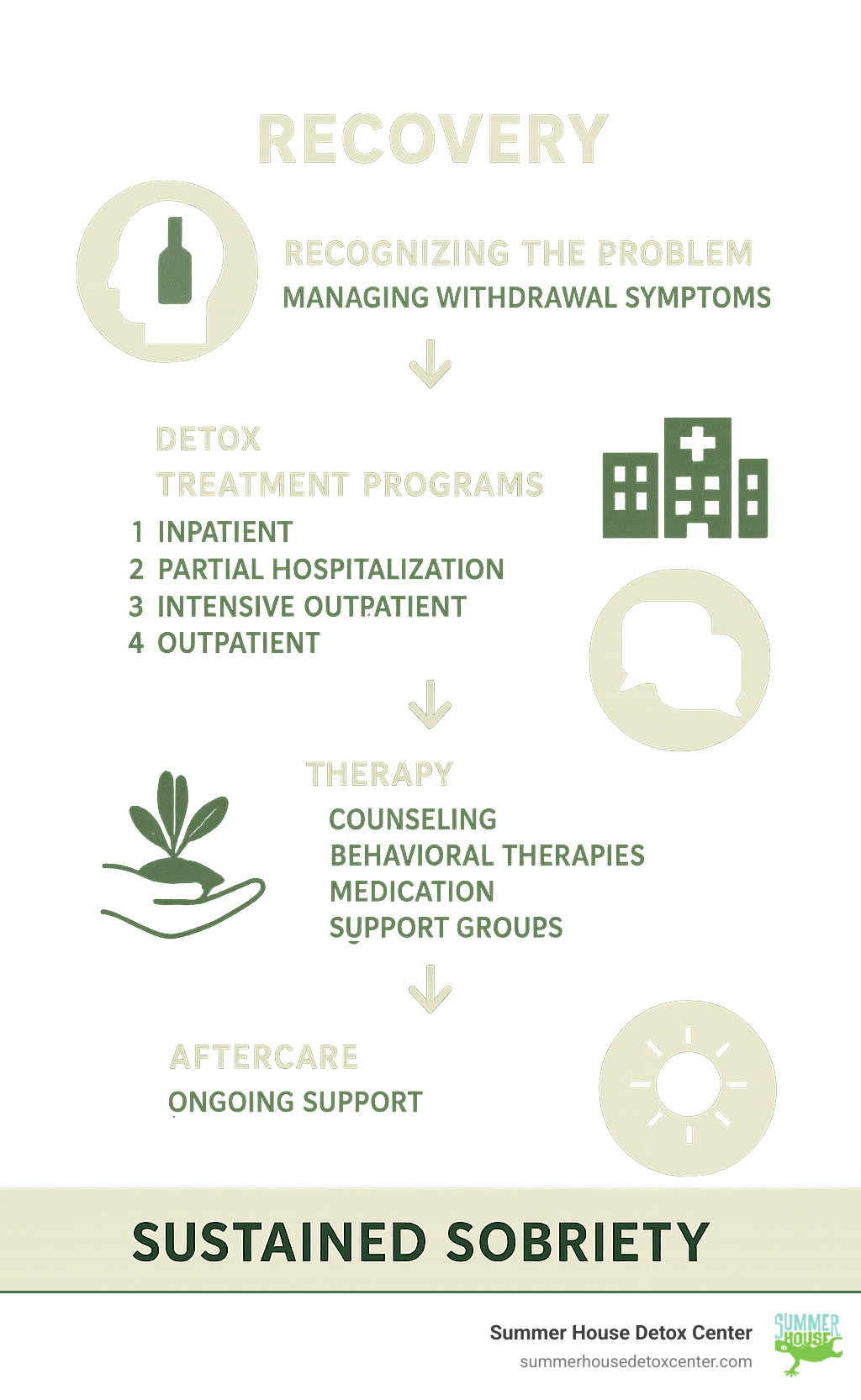Why Alcohol Rehab Programs Are Your Best Shot at Recovery
Alcohol rehab programs come in many forms, but they all share one goal: helping you break free from addiction safely and permanently. Treatment works, with success rates similar to managing other chronic conditions like diabetes or hypertension.
Programs range from 24/7 inpatient/residential care (30-90+ days) and daily Partial Hospitalization (PHP) to flexible Intensive Outpatient (IOP) and weekly therapy. The first step is often a medically managed detox program (3-7 days).
Effective programs include medically supervised detox, evidence-based therapies like CBT and DBT, medication-assisted treatment, dual diagnosis care, and robust aftercare planning.
The most important thing to know? You don’t have to quit “cold turkey” on your own. Alcohol withdrawal can be life-threatening, with symptoms ranging from anxiety to seizures. Professional help isn’t just recommended—it’s essential for your safety. The key is matching your specific needs to the right level of care.

Quick look at alcohol rehab programs:
Understanding Alcohol Use Disorder and Why Treatment Is Essential

Alcohol addiction is not a matter of willpower. It’s a chronic brain disease called Alcohol Use Disorder (AUD), which requires professional treatment to manage effectively. Untreated, AUD can damage your health, career, and relationships. That’s why alcohol rehab programs are essential for getting your life back.
What is Alcohol Use Disorder (AUD)?
AUD is a medical condition where you can’t control your drinking, even when it causes serious problems. It exists on a spectrum from mild to severe. You might have AUD if you drink more than planned, want to cut back but can’t, experience cravings, or find that alcohol interferes with your responsibilities. Many people self-medicate emotional pain, which can spiral into dependence. It’s important to recognize the early signs of addiction, even in cases of high-functioning alcohol addiction.
The Critical First Step: Medically Supervised Detox
If you’re physically dependent on alcohol, stopping suddenly is dangerous. Medically supervised detox is the critical first step. According to WebMD, withdrawal can start within 6-24 hours, with symptoms ranging from anxiety and shakiness to life-threatening complications like seizures and Delirium Tremens (DTs). Trying to quit “cold turkey” is never recommended. Our medical detox provides a safe, supervised environment to manage these symptoms. Detox is just the beginning; it stabilizes your body so the real work can begin. We also focus on the role of nutrition in detox to help you heal. After detox, the real recovery work begins, which answers the question of what happens after alcohol detox.
Why Professional Treatment is a Non-Negotiable for Recovery
Lasting recovery requires comprehensive care. Professional alcohol rehab programs help you break the cycle of addiction by addressing the root causes of your drinking, such as trauma or mental health conditions. You’ll develop healthy coping skills to manage stress and triggers, and build a strong support system of peers and therapists. The National Institute on Alcohol Abuse and Alcoholism emphasizes that effective treatments are backed by science. Seeking help takes courage, and we’re committed to breaking the stigma around getting the support you deserve.
The Core Components of Modern Alcohol Treatment
Modern alcohol rehab programs use evidence-based care and individualized treatment plans for holistic healing. This isn’t just about stopping drinking; it’s about building a therapeutic alliance that addresses your mind, body, and spirit.
Behavioral Therapies: Rewiring Your Brain for Sobriety
Behavioral therapies help you understand your triggers and learn new ways to cope.
- Cognitive Behavioral Therapy (CBT) helps you identify and change the negative thought patterns that lead to drinking. We use CBT at our alcohol rehab to provide practical, daily tools.
- Dialectical Behavior Therapy (DBT) is effective for intense emotions, teaching skills like mindfulness, distress tolerance, and emotion regulation.
- Motivational Interviewing helps you explore your own reasons for wanting to change, which is powerful if you’re feeling ambivalent about treatment.
These therapies are offered in individual, group, and family settings to provide comprehensive support. Understanding the role of therapy in detox is crucial for early success.
Medication-Assisted Treatment (MAT)
FDA-approved, non-addictive medications can make recovery easier. Medication-Assisted Treatment (MAT) works alongside therapy to improve your chances of success.
- Naltrexone reduces cravings and blocks the pleasurable effects of alcohol.
- Acamprosate helps with lingering withdrawal symptoms like anxiety and restlessness.
- Disulfiram causes an unpleasant reaction if you drink, acting as a deterrent.
Our team can help you in understanding Medication-Assisted Treatment and discuss if medications and recovery are right for you.
Treating the Whole Person: Dual Diagnosis and Holistic Care
Addiction often co-occurs with mental health conditions like depression or anxiety. Our dual diagnosis rehab treats both simultaneously for a better outcome. We also believe in nurturing your whole self. Holistic care includes nutrition to heal the body, mindfulness and meditation to manage cravings, and yoga and exercise to boost mood. We also use experiential therapies like art and music therapy. By combining medical and natural therapies for recovery, we help you build a life you want to live sober.
Navigating the Different Levels of Alcohol Rehab Programs
Finding the right alcohol rehab program involves matching your needs to the correct level of care, as outlined by the American Society of Addiction Medicine (ASAM). A complete assessment helps determine which level of care offers the best chance at recovery. The NIAAA offers a great resource on Treatment for Alcohol Problems.
Inpatient and Residential Treatment: Immersive, 24/7 Care
Inpatient and residential treatment provides a safe, structured environment where recovery is your only focus. This is the highest level of care, often involving 24/7 medical supervision in a hospital-like setting or living at a facility for 30, 60, or 90+ days. This immersive approach removes you from daily triggers and stressors. It’s ideal if you have severe AUD, a history of dangerous withdrawal, or an unstable home environment. We can help you understand the difference between inpatient vs. outpatient programs and even help you figure out how to pack for alcohol treatment in Florida.
Outpatient Alcohol Rehab Programs: Flexibility for Real Life
Outpatient programs allow you to maintain work, school, or family commitments while receiving structured therapy.
- Partial Hospitalization Programs (PHP) offer intensive daily therapy, but you return home at night.
- Intensive Outpatient Programs (IOP) involve 9-15 hours of therapy per week, fitting around your schedule.
- Standard outpatient care consists of weekly therapy sessions, often as a step-down from more intensive programs.
Success in outpatient care requires a stable, substance-free living environment. Our main treatments available in alcohol rehab include these flexible options.
Modern and Alternative Treatment Options
The world of alcohol rehab programs is always evolving. Modern options can complement traditional treatment:
- Telehealth provides professional support through phone or video sessions.
- eHealth options like mobile apps offer self-help resources and tracking tools.
- Building a custom care team with licensed therapists and doctors offers a highly personalized approach.
- Sober coaching provides non-clinical, real-world guidance and support throughout your recovery journey.
How to Choose a Quality Program and Handle the Logistics

Choosing the right alcohol rehab program is like selecting a doctor for a serious medical condition. You want qualified, experienced professionals who genuinely care. Making an informed decision starts with asking the right questions.
Key Factors in Selecting the Best Alcohol Rehab Programs
When evaluating programs, look for these non-negotiable factors:
- Accreditation and Licensing: Ensure the facility is licensed by the state and accredited by organizations like The Joint Commission or CARF.
- Staff Credentials: Look for a multidisciplinary team of licensed doctors, psychiatrists, and therapists with addiction-specific training.
- Evidence-Based Methods: The program should use scientifically proven therapies like CBT, DBT, and MAT.
- Individualized Care: A quality program will create a personalized treatment plan that adapts to your progress.
- Aftercare Planning: Robust aftercare planning is essential for long-term success.
- Dual Diagnosis Treatment: This is critical if you have co-occurring mental health issues.
We’ve outlined seven services to look for when choosing an alcohol rehab center and provided guidance on choosing the best Miami alcohol rehab center.
Funding Your Recovery: Insurance and Payment Options
Cost is a major concern, but most health insurance plans are required to cover substance use disorder services. Your first step is to verify your insurance benefits to understand your coverage. Our admissions team can help with this process. Understanding the difference between in-network and out-of-network providers can also save you money. For those without insurance, government resources like FindTreatment.gov and private pay options like sliding scale fees or payment plans are available.
Public vs. Private Treatment: Understanding Your Choices
You’ll encounter both government-funded (public) and private treatment programs. While public programs are vital, they may have longer wait times and less individualized care due to funding limitations. Private programs typically offer prompt admission, comfortable amenities, and highly personalized treatment.
| Feature | Government-Funded Programs | Private Programs |
|---|---|---|
| Cost | Low to no direct cost for the patient | Higher cost, often covered by private insurance or out-of-pocket |
| Wait Times | May have longer wait lists and limited beds | Prompt admission, often no wait lists |
| Amenities | Basic facilities, often dormitory-style | High-comfort environments, private rooms, luxury amenities |
| Staff-to-Client Ratio | Potentially higher staff-to-client ratios | Typically lower staff-to-client ratios, more individual attention |
| Program Specialization | Broader public focus, may be more basic | Highly specialized, individualized treatment plans |
The best choice depends on your specific situation, timeline, and needs.
Life After Rehab: Building a Foundation for Lasting Sobriety
Completing an alcohol rehab program is a huge achievement, but it’s the start of a lifelong journey. The goal is to build a fulfilling life you don’t need to escape from. You’re not the same person who entered treatment; you now have tools, skills, and a support system to help you thrive as you transition to life after detox.
The Crucial Role of Aftercare and Relapse Prevention
Aftercare is the bridge between rehab and long-term recovery. This includes continuing care plans developed before you leave, sober living environments for transitional support, and alumni programs for lasting connection. A key part of aftercare is learning to identify your triggers (internal and external) and building a toolkit of healthy coping strategies. Relapse is not a failure; it’s a signal to re-engage with treatment and adjust your plan. Resources like alcohol rehab after a relapse are available, and we guide clients through the next steps after completing a detox program.
Finding Your Community: Mutual Support Groups
Peer connection is one of the most powerful tools in recovery. Mutual support groups are free, accessible, and provide a vital sense of community.
- Alcoholics Anonymous (AA): A 12-Step fellowship based on the principle of one alcoholic helping another. As AA’s official website explains, it’s “a simple program that works.”
- SMART Recovery: Uses scientific principles and CBT to help you gain independence from addiction.
- Women for Sobriety: A supportive program designed to address the unique challenges women face in recovery.
- LifeRing Secular Recovery: An abstinence-based, secular approach emphasizing personal empowerment.
Try different groups to find one that feels like home. Building a network of the 6 types of people you need in sobriety is crucial.
Cultivating a Healthy and Fulfilling Sober Life
Sobriety is about what you can do now that you’re free. This is your chance to refind hobbies and passions, build healthy relationships, and develop effective stress management techniques like exercise, mindfulness, and spending time in nature. Taking care of your physical health through proper nutrition and sleep provides a foundation for your mental and emotional recovery. By bolstering your recovery with healthy choices, you can experience the 7 amazing ways your life will change after alcohol rehab. You’re not just getting your life back—you’re creating a better one.
Frequently Asked Questions about Alcohol Treatment
It’s normal to have questions when considering an alcohol rehab program. Here are answers to some of the most common ones.
How long does alcohol rehab last?
The length of rehab depends on your individual needs. There is no one-size-fits-all answer.
- Detox typically lasts 3-7 days.
- Residential programs often run for 30, 60, or 90 days. Research shows that longer stays (90+ days) are linked to better long-term outcomes.
- Outpatient programs are flexible and can last for several weeks to several months, often as a step-down from inpatient care.
We discuss how long alcohol treatment lasts after detox with each person to create a timeline that is as unique as they are.
Can I lose my job for going to rehab?
This is a common fear, but in most cases, you cannot lose your job for seeking treatment. Federal laws offer protection.
- The Family and Medical Leave Act (FMLA) allows eligible employees to take up to 12 weeks of unpaid, job-protected leave for medical treatment, including rehab.
- The Americans with Disabilities Act (ADA) protects you from discrimination based on your recovery status, as long as you can perform your job duties.
Your treatment is confidential. Seeking help is a sign of strength, and many employers would rather support a valued employee’s recovery than lose them.
What happens if I relapse after treatment?
Relapse is not a failure. Addiction is a chronic disease, and setbacks can happen. Think of it as a sign that your recovery plan needs adjustment, not that treatment didn’t work.
If you relapse, the most important thing is to get back into treatment quickly. Don’t let shame keep you from reaching out. A relapse provides valuable information about your triggers and which coping skills need more attention. Your treatment team will work with you to adjust your plan and strengthen your recovery. This isn’t starting over; it’s continuing your journey with more knowledge. We provide compassionate support for alcohol rehab after a relapse to help you get back on track.
Your Path to Recovery Starts Today
We hope this guide has shown you that alcohol rehab programs are effective and that recovery is absolutely possible. A full spectrum of proven treatments exists to meet you exactly where you are.
You don’t have to figure this out alone. The first step—whether it’s acknowledging a problem or making a call—is the most important one.
At Summer House Detox Center, we understand that starting this journey is overwhelming. We focus on personalized, medically supervised detox that prioritizes your comfort, dignity, and safety. Our experienced team gets it—some are in recovery themselves and understand what you’re going through.
We create personalized treatment plans for optimal recovery custom to your unique needs and goals.
Your path to a healthier, happier life starts today. Not tomorrow, not next week. Today. You deserve to feel good again, and we’re here to help you get there safely.

